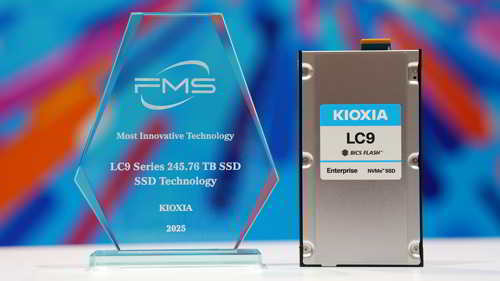FMS 2025: Kioxia LC9 Series 245.76TB Enterprise SSD with 32-die Stack Memory Named ‘Best of Show’
245.76TB NVMe SSD in 2.5-inch and EDSFF E3.L form factor
This is a Press Release edited by StorageNewsletter.com on August 7, 2025 at 2:02 pmKioxia Corporation announced that its LC9 Series 245.76TB (1) enterprise SSD, utilizing a 32-die stack BiCS FLASH Gen 8 QLC 3D flash memory, has received the FMS ‘Best of Show’ award in the ‘SSD Technology’ category.
These awards recognize the cutting-edge products, services, and customer implementations that are pushing the boundaries of memory and storage technology.
The industry’s first (2) 245.76TB (1) NVMe SSD in a 2.5-inch and Enterprise and Datacenter Standard Form Factor (EDSFF) E3.L form factor, the company’s LC9 Series drives are well-suited to GenAI and enterprise applications. LC9 Series SSDs are sampling to select customers.
“When customers evaluate SSDs, important consideration is given to storage that scales to high capacities while delivering high performance and low power consumption,” said Jay Kramer, chair, awards program and president, Network Storage Advisors Inc. “We are proud to recognize Kioxia for its BiCS FLASH 3D flash memory and Kioxia LC9 Series SSD. This solution is enabled by their CBA (CMOS directly Bonded to Array) technology and the innovation of a 32-die stacked architecture in a package – delivering the capacity, power and density required for transformational SSDs. Creating the highest capacity (2) PCIe 5.0 enterprise SSD is a remarkable achievement and a clear reflection of Kioxia’s leadership position.”
Featuring a 32-die stack of 2Tb (3) BiCS FLASH QLC 3D flash memory with innovative CBA technology, the firm’s LC9 Series SSDs deliver the speed, scale, and density required to support the next wave of AI-centric workloads. This combination of advanced memory architecture and CBA technology enables 8TB (3) in a small 154 BGA package – also an industry first (2). This milestone was made possible with advancements in Kioxia’s high-precision wafer processing, material design, and wire bonding technologies.
(1) Definition of SSD capacity: Kioxia Corporation defines a kilobyte (KB) as 1,000 bytes, a megabyte (MB) as 1,000,000 bytes, a gigabyte (GB) as 1,000,000,000 bytes, a terabyte (TB) as 1,000,000,000,000 bytes, and a kibibyte (KiB) is 1,024 bytes. A computer operating system, however, reports storage capacity using powers of 2 for the definition of 1GB = 2^30 bytes = 1,073,741,824 bytes and 1TB = 2^40 bytes = 1,099,511,627,776 bytes and therefore shows less storage capacity. Available storage capacity (including examples of various media files) will vary based on file size, formatting, settings, software and operating system, and/or pre-installed software applications, or media content. Actual formatted capacity may vary.
(2) As of August 6, 2025, based on Kioxia survey.
(3) The flash memory capacity is calculated as 1 terabit (1 Tb) = 1,099,511,627,776 (2^40) bits, and 1 terabyte (1 TB) = 1,099,511,627,776 (2^40) bytes.










 Subscribe to our free daily newsletter
Subscribe to our free daily newsletter

